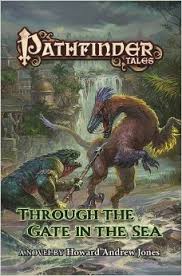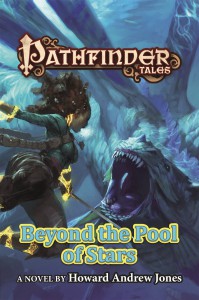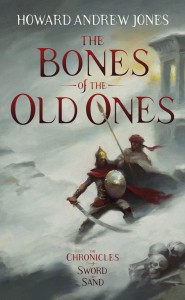Behind the Scenes
 A few weeks ago Paizo’s James Sutter asked me to draft an essay about my newest Pathfinder novel, Through the Gate in the Sea. It ended up being a peek behind how I drafted the novel, with a little discussion about my own role-playing gaming. If that sounds of interest, you can find it here.
A few weeks ago Paizo’s James Sutter asked me to draft an essay about my newest Pathfinder novel, Through the Gate in the Sea. It ended up being a peek behind how I drafted the novel, with a little discussion about my own role-playing gaming. If that sounds of interest, you can find it here.
I think this novel, and its predecessor, Beyond the Pool of Stars, are stronger than their predecessor Pathfinder novels. In particular I love the characters, and would like to return to them someday. The famously hard-to-please reviewer known as Mrs. Giggles even seemed to like this one, although she couldn’t help sideswiping the previous novel a little as she talked it up. Ah well. I was pleased that she enjoyed the book as much as she did!
This week also brought a video review from Dungeon Master Mark, one which could only be described as glowing. So, good news all around, actually.
 When I first become a professional writer I used to regularly keep an eye out for reviews. These days I don’t — I wouldn’t have learned about Dungeon Master Mark’s review if he hadn’t contacted me. Curious to see if there had been ANY other reviews I actually broke my resolve, surfed about, and found that one by Mrs. Giggles.
When I first become a professional writer I used to regularly keep an eye out for reviews. These days I don’t — I wouldn’t have learned about Dungeon Master Mark’s review if he hadn’t contacted me. Curious to see if there had been ANY other reviews I actually broke my resolve, surfed about, and found that one by Mrs. Giggles.
Too often, reading reviews is like getting a gut punch. I grew tired of discovering one or two-star reviews on Goodreads or Amazon where someone didn’t like my adventure novel because it wasn’t very funny (where did they get the idea it would be a comedy?) or because the elf was wearing the wrong hat, or even because the reviewer was sloppy and wrote a scathing review of the wrong Pathfinder novel and tagged it to mine.
It’s different when the criticism is legitimate, or where you can see the point, and it’s most painful when the critic is wrong-headed and very shrill. A reading group for one of my novels decided that I was a misogynist and that I had stolen my plot from a game I’d never heard of. I get a lot of praise for my characterization, but now and then I get complaints that they’re wooden, and I can only assume that’s because my characters don’t constantly emote all over the page and tell you what they’re feeling, as we see in a lot of modern YA, or in anime.
 But I can’t ever really know why some people see some things in my writing I don’t think is there, or why they miss things that are, and I’ve managed to stop losing sleep over it. You can’t control how anyone reacts, and people arrive at your book with different expectations. It may be that they expect EVERY writer to write only like their favorite author does, and it may be that they don’t know what a certain genre of novel is intended to deliver, or that they can’t help looking down their nose a little at what you’re doing because they’ve been taught only literary writing is truly good. It may even be that your style of writing just doesn’t click with them, which I understand — enough that that sort of honest difference doesn’t sting.
But I can’t ever really know why some people see some things in my writing I don’t think is there, or why they miss things that are, and I’ve managed to stop losing sleep over it. You can’t control how anyone reacts, and people arrive at your book with different expectations. It may be that they expect EVERY writer to write only like their favorite author does, and it may be that they don’t know what a certain genre of novel is intended to deliver, or that they can’t help looking down their nose a little at what you’re doing because they’ve been taught only literary writing is truly good. It may even be that your style of writing just doesn’t click with them, which I understand — enough that that sort of honest difference doesn’t sting.
When the next big book drops, as I launch the first book of my new trilogy, I may be on pins and needles and am likely to find myself waiting for the reviews to roll in. I hope I won’t drive myself crazy when I do so. I have a lot riding on this one. I’ve been working on it since 2014, and it has characters and plot situations I’ve been working with since the 1990s. I’ve really poured my heart and soul into the thing, moreso than with any preceding novel.
I’ll have to harden my heart, though, because I know that there will be some nasty words said about it at some point, probably in short, blithe declarative sentences, possibly ungrammatical, that will nevertheless effect my overall rating on Amazon or Goodreads to the same effect as a thoughtful, well-considered review. Here’s hoping that I’ll be able to ruefully shake my head and move on, as I’ve had to learn to do over the years.
3 Comments